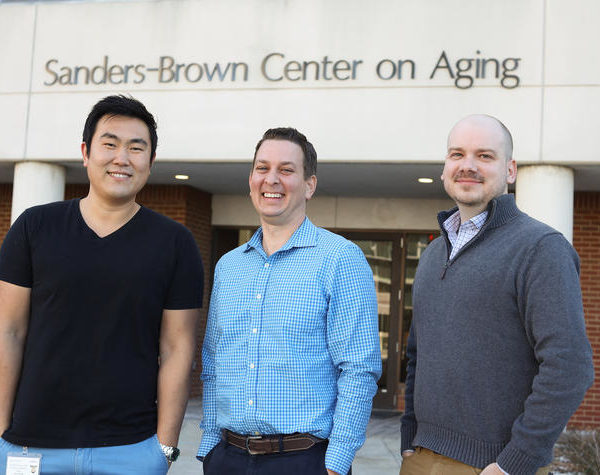LEXINGTON, Ky. — Three Sanders-Brown Center on Aging researchers are the first at the University of Kentucky to receive financial backing from the Cure Alzheimer’s Fund.
CureAlz is a non-profit organization dedicated to funding research with the highest probability of preventing, slowing, or reversing Alzheimer’s disease. The organization puts 100% of donations into research, with around 600 grants given out to date.

UK’s Lance Johnson, Ph.D., Josh Morganti, Ph.D., and Ramon Sun, Ph.D., are some of the newest recipients of this funding.
“CureAlz has a history of supporting some of the brightest scientific minds in the field, so it’s been a humbling experience to have this prominent foundation support our work. We have big shoes to fill, but I’m excited for the opportunity to push the research forward with their backing,” said Johnson.
The funding allows for the continuation of the researchers’ collaborative work looking into the role of Apolipoprotein E (APOE) in modulating brain metabolism. Alzheimer’s is characterized by changes in both metabolism and inflammation. Notably, the E4 allele of APOE – the strongest genetic risk factor for AD – is also associated with both metabolic dysfunction and a heightened pro-inflammatory response. Their study uses state-of-the-art methods to determine whether E4 drives Alzheimer’s risk by affecting metabolism within microglia, the resident immune cells of the brain. If successful, the studies could provide new therapeutic targets to help normalize brain metabolism, which would then potentially prevent or delay the onset of Alzheimer’s in high-risk individuals.
The three researchers all work within Sanders-Brown but the collaborative multidisciplinary approach can be seen through their other affiliations on campus. Sun is an assistant professor of Neuroscience in the UK College of Medicine and works with the Markey Cancer Center, and the Spinal Cord and Brain Injury Research Center (SCoBIRC). Morganti is also an assistant professor of Neuroscience and in addition to working with Sanders-Brown, he also works with SCoBIRC. Johnson is an assistant professor in Physiology.
While Johnson says he obviously feels their work is unique and important, he believes a big reason CureAlz took notice is because of the outstanding research environment at UK. “The facilities and resources in the Sanders-Brown Center on Aging and our home departments, and the motivated trainees and staff, are the reason we are able to turn enthusiastic ideas into actual results.”
The robust research environment at UK allows for multidisciplinary collaboration all over campus. That is a key piece to a lot of research that goes on at Sanders-Brown, including this work, due to the understanding that Alzheimer’s is a multifaceted disease. “I think we now have a better appreciation for Alzheimer’s disease as a complex multifactorial disorder, where things like one’s genetic predisposition – like APOE genotype – and environmental factors interact with disease processes,” said Johnson. “When the problem is so complex, I think the best approach is a multidisciplinary one. Thankfully the collaborative environment here at UK is such that even as Drs. Sun and Morganti are busy pushing the limits of technology in metabolic imaging and high-resolution transcriptomics, they are nice enough to always share their ideas, their methods, and their time. Working together in this way has allowed us to push the work forward in ways that wouldn’t be possible on our own.”
Since CureAlz was founded in 2004, its focus has been providing research grants to the world’s leading scientists researching Alzheimer’s disease. To date, they have contributed more than $141,000,000 to Alzheimer’s research. Many of the projects funded by CureAlz resulted in significant breakthroughs, developing a deeper understanding of Alzheimer’s disease, and getting closer to a cure.
Click here for more Kentucky business news.



















